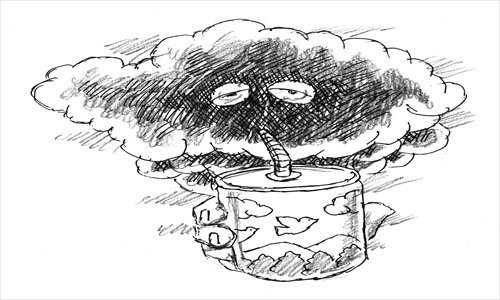Selling air opens intriguing can of worms

As the old adage goes, you get what you pay for. But one really has to wonder what is going through the heads of consumers lining up to fork out money for a whole can of nothing. In case you missed it, businessman and philanthropist Chen Guangbiao's latest venture involves selling canned air for 5 yuan ($0.80) a pop.
The air is from sites including some revolutionary bases, such as Jinggangshan in Jiangxi Province and Yan'an in Shaanxi Province, and some ethic regions such as Yushu in Qinghai Province. Breathing this air can clear one's head and brighten one's spirit, or at least that's Chen would have you believe.
Like many of his other publicity stunts, Chen's bid to sell air to raise awareness about environmental protection has been met with ridicule. Many have pointed out the massive carbon footprint of the scheme considering cans are collected, compressed, packaged and transported to Beijing.
The other issue is how can people tell they are really breathing mountain-fresh air? What good is a small soda can-sized dosage of air going to do? It's not as if the canned air's target market is people with respiratory diseases or high-altitude dwellers. People might as well go to the suburbs to enjoy free fresh air.
Apparently, you can sell anything these days and there will always be people who are willing to pay for a new product. But I applaud Chen for thinking outside the box, as it proves ultimately bold ideas can be rewarded.
Chen is by no means the first entrepreneur to dabble in selling canned air. Kirill Rudenko, a photographer from the Czech Republic capital of Prague, recently started selling canned air online from cities such as Paris, New York, Prague and Berlin for $9.99.
The air Rudenko sells comprises of a formula depending on each city. Air from Paris, for example, allegedly contains samples from The Louvre, Notre Dame, the Eiffel Tower and the Champs-Elysées. The can's label even states tongue-in-cheek that the air may contain traces of "liberté, égalité and fraternité" (literally "liberty, equality and fraternity" - France's national motto).
I don't think the people who buy these cans are really so naïve as to believe that the air is necessarily from the cities it claims to be from. It's really a humorous, ingenious idea that appeals to people seeking a novelty gift. It's refreshing, not because it contains rich amounts of negative oxide ions, but because it's a creative concept.
But not all "refreshing" concepts smell as nice. Italian artist Piero Manzoni created an artwork in 1961 titled Artist's Sh**, which consisted of 90 cans of preserved feces. A year earlier, Manzoni produced Artist's Breath, which was a collection of balloons filled with his breath.
Compared to Rudenko and Manzoni, Chen's canned air suddenly seems less fun. But it does get us thinking about what we all take for granted: breathing. Beijing's ubiquitous gray skies are a constant reminder of how precious fresh air is.
In 1987 sci-fi comedy Spaceballs, Planet Spaceball exhausts its own air and tries to steal fresh air from a neighboring planet. Who is to say such a fate won't befall our city one day? We might as well start stocking up on air.